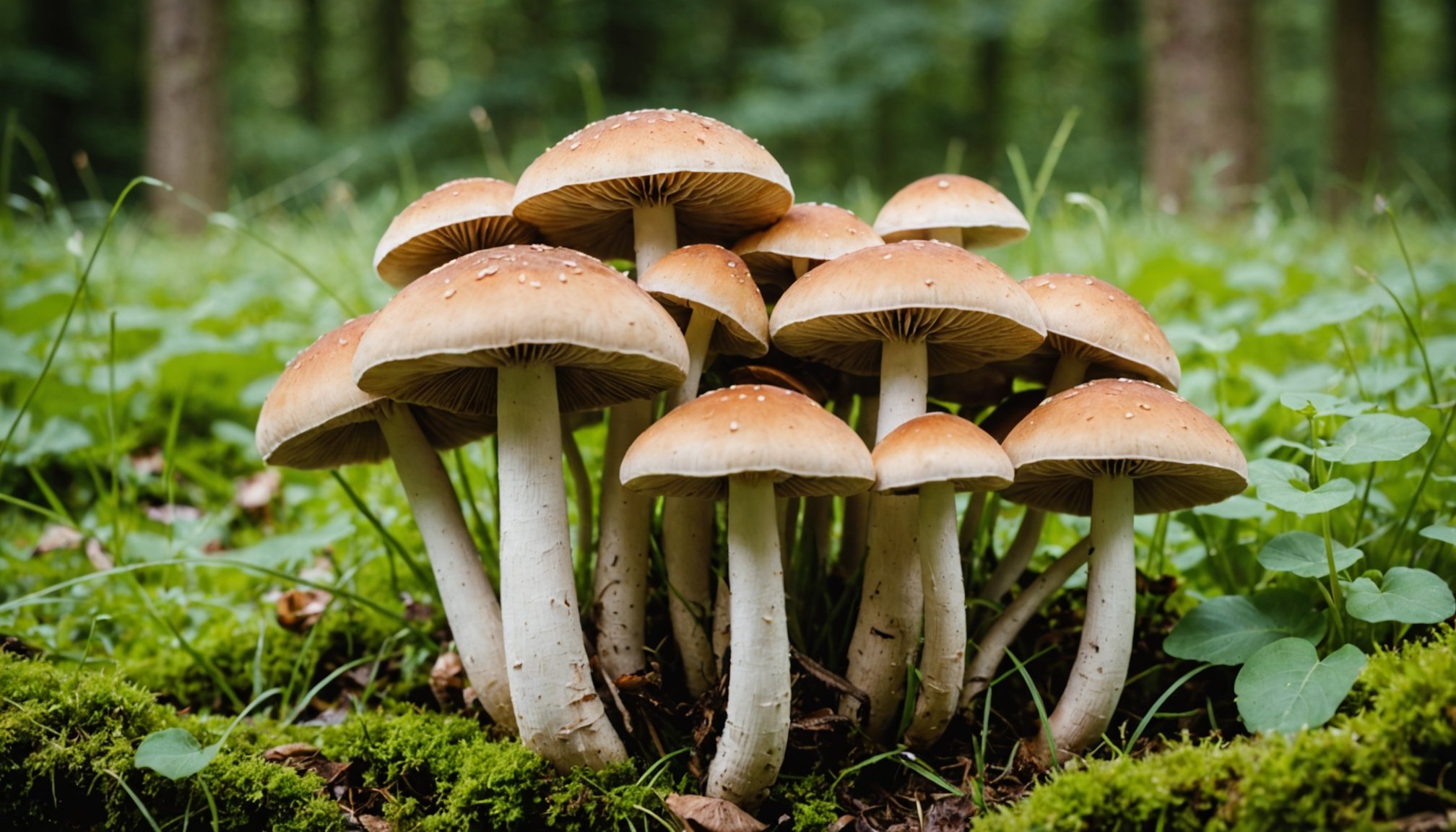Overview of Mushroom Farming Practices in the UK
Mushroom farming has a rich history in the UK, with its development rooted in both tradition and innovation. Mushroom farming in the country has evolved significantly from its early days when mushrooms were primarily grown in caves. Today, the UK is at the forefront of integrating sustainable agriculture with modern farming practices.
Sustainable agriculture has become a cornerstone of the UK’s approach to mushroom farming. With increasing concerns about the environmental impact of traditional agricultural methods, sustainability is now a priority. By embracing sustainable methods, UK farmers aim to reduce the carbon footprint of their operations, promote biodiversity and improve soil health, ensuring the long-term viability of their farms and surrounding ecosystems.
Also read : Transforming rural healthcare: key approaches for effective telehealth adoption in uk communities
The diversity of mushroom types cultivated in the UK reflects this commitment to sustainability and innovation. Common varieties include button, portobello, and shiitake mushrooms, each requiring specific farming practices to thrive, which are tailored to their unique growth needs. Farmers utilize advanced techniques and organic methodologies to ensure optimal yields while minimizing environmental impact. The focus on sustainable agriculture not only helps in preserving natural resources but also offers economic benefits by tapping into growing markets for organic produce. This comprehensive approach helps position the UK as a leader in sustainable mushroom farming.
Environmental Benefits of Mushroom Cultivation
Mushroom farming is a prominent example of how agricultural practices can harmonize with environmental sustainability. Central to its ecological advantages is its role in improving soil health. Mushrooms decompose organic materials, breaking them down into simpler substances, which enrich the soil by replenishing nutrients. This process also helps in creating organic substrates that support other plant life, fostering a healthier ecosystem.
This might interest you : Boosting stem passion among uk girls: innovative approaches to elevate educational engagement
Furthermore, mushroom cultivation is noted for its ability to reduce waste. Farmers frequently recycle agricultural by-products, such as straw and corn cobs, as mushroom substrates, minimizing waste simply otherwise destined for landfills. This not only decreases the overall carbon footprint of farming activities but also utilizes natural resources more efficiently.
Lastly, mushrooms contribute significantly to biodiversity preservation. By sustaining various microhabitats and encouraging different fungal species, mushroom farming aids in maintaining ecological balances. It ensures that diverse microbial communities thrive, supporting a wide range of species within local ecosystems. These environmental benefits underline why mushroom cultivation is integral to sustainable agriculture practices, highlighting its role in nurturing a more balanced and resilient natural world.
Innovative Techniques in Sustainable Mushroom Farming
Sustainable mushroom farming in the UK is marked by a range of innovative techniques designed to harmonise with nature while maximising yield. These techniques are fundamental to preserving resources and promoting ecological balance.
Substrate Utilization
A cornerstone of sustainable farming is the efficient use of substrates. UK farmers frequently employ agricultural by-products, such as straw and sawdust, reducing waste. This technique is environmentally friendly and lowers production costs, enabling farmers to repurpose materials that would otherwise contribute to landfill.
Climate Control Practices
Incorporating climate-responsive practices is crucial for maintaining optimal conditions for mushroom growth. Farmers use advanced technologies to regulate temperature and humidity within growing environments, thus ensuring consistent yields. This approach not only bolsters productivity but also minimises energy use, aligning with sustainable goals.
Pest Management Strategies
Effective pest management in mushroom farming hinges on both organic and integrated strategies. By using biological controls and natural repellents, farmers can mitigate pest-related damage without the adverse effects of chemical pesticides. This strategy supports healthier ecosystems and safeguards biodiversity. Sustainable techniques in farming innovation enrich the cultivation methods, signifying a pivotal shift towards ecologically responsible practices within the sector.
Case Studies of Successful Mushroom Farms in the UK
Exploring success stories of UK farms offers substantial insights into the practices and outcomes that define thriving mushroom farming. These case studies highlight how sustainable methods can transform agriculture on various fronts.
One such example is a farm in Herefordshire, renowned for its innovative use of organic farming practices. This farm integrates sustainable agriculture by utilising solar panels to power its operations and implementing water recycling systems. This results not only in reduced carbon footprint but also lowered production costs, showcasing a blend of environmental and economic success.
Another notable case in Scotland exemplifies urban agriculture. This farm operates within city limits and utilises vertical farming techniques, maximising space while maintaining high yield quality. By fostering community involvement, it boosts local employment, illustrating the potential for job creation in urban areas, along with keeping the local economy vibrant.
The impact on local communities extends beyond direct economic contributions. These farms offer educational workshops and collaborate with schools, highlighting the importance of sustainability in modern agriculture. By drawing on these farming case studies, future agripreneurs can glean actionable insights, inspiring further developments in the field of sustainable mushroom farming.
Economic Impacts of Sustainable Mushroom Farming
In the UK, the embrace of sustainable agriculture within mushroom farming brings significant economic benefits. Farmers who adopt these eco-friendly methods often see improved farming profitability, thanks to the decreased costs associated with resource-efficient practices. For instance, using agricultural by-products as substrates is not only environmentally sound but also reduces input costs, enhancing overall profitability.
Moreover, the market for sustainably grown mushrooms is experiencing a notable rise. This growing demand stems from consumers who value environmentally conscious products, driving market trends towards organic and sustainable food options. Consequently, mushroom farmers are in a prime position to capture this market segment, ensuring a steady stream of revenue.
Another key aspect is the potential for job creation within the agricultural sector. As sustainable practices expand, so do opportunities for employment in areas such as farm operations, research, and development. This not only benefits individual families but also boosts local economies, fostering a vibrant community atmosphere.
With these economic impacts in mind, mushroom farming not only supports environmental sustainability but also provides financial incentives for current and future farmers. The transition to sustainable methods thus emerges as both a responsible and profitable path in the agricultural landscape.
Guidelines for Farmers Transitioning to Sustainable Practices
Transitioning to sustainable agriculture is a pivotal move for many mushroom farmers in the UK. Adopting effective farming guidelines can streamline this process, promising both environmental and economic gains.
Education and Training Resources
Access to education and training resources is crucial. Workshops, courses, and seminars offer invaluable insights into modern farming methodologies. These avenues equip farmers with the necessary skills to implement eco-friendly practices effectively.
Certification Programs
Engaging in certification programs ensures recognition of sustainable efforts. Such certifications not only demonstrate commitment to responsible farming but also enhance marketability. Organic and sustainability labels can attract environmentally-conscious consumers, driving market trends.
Community Support Networks
Building community support networks aids the transition by fostering collaboration. Farmers benefit from shared experiences and collective advice, enhancing their ability to navigate challenges. Networking promotes a supportive environment, crucial for overcoming the hurdles of shifting farming practices.
These strategies provide a solid framework for mushroom farmers aiming to embrace sustainability. By prioritising educational advancement, formal certifications, and community engagement, farms can achieve a successful and seamless transition. This aligns with the broader drive for responsible and innovative farming practices in the UK.
Future Trends in Mushroom Farming and Sustainability
The future of mushroom farming is set to be influenced by ongoing innovations and enhanced sustainability efforts. One notable trend is the increasing integration of technology within farming practices. Advances such as AI-driven climate controls and precision farming tools are anticipated to further optimize growing conditions, thereby increasing yield efficiency while minimizing environmental impact. These technological solutions are not only eco-friendly but also operationally advantageous, supporting both productivity and sustainability goals.
Emerging market trends favour sustainable and organic produce, including mushrooms. This shift towards responsible consumption habits is expected to open new consumer markets and create opportunities for product differentiation based on sustainable credentials. These preferences push farmers to continually adapt their methods to meet consumer demand for transparency and eco-conscious practices.
Furthermore, innovation in substrates, such as developing biodegradable packaging from mushroom mycelium, may pave the way for additional eco-friendly applications. This holistic approach extends the sustainability of mushroom farming beyond cultivation into processing and distribution.
As the sector evolves, future trends reflect a growing synergy between cutting-edge technology, sustainability, and consumer inclinations, driving forward a more sustainable future for mushroom farming globally. Adapting to and embracing these changes is paramount in securing the competitive edge and fostering environmental stewardship.








